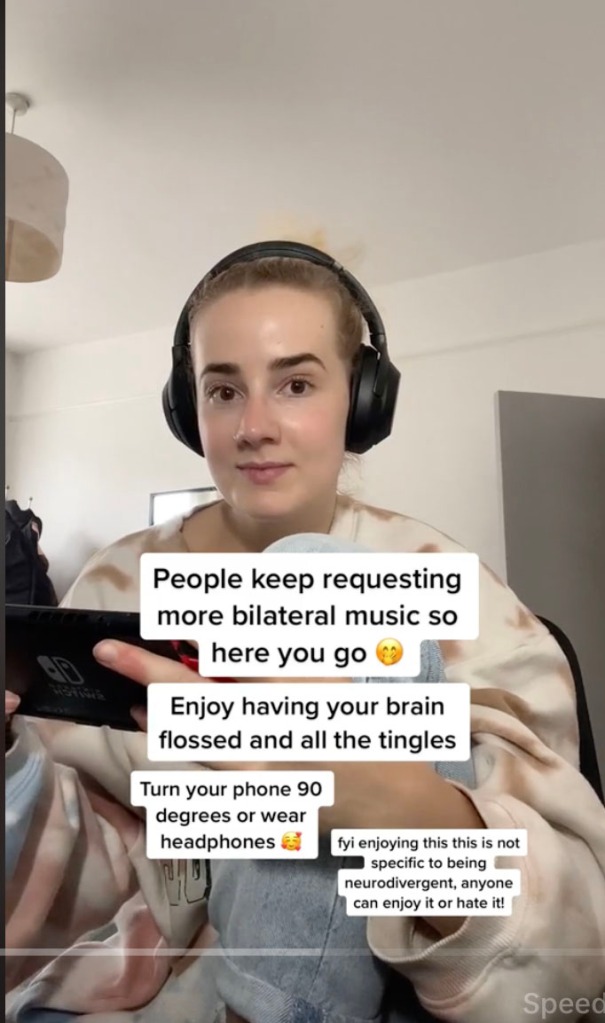‘Brain flossing’ hailed as mental health hack: ‘Brought me to tears’
This craze just might rub you the right way.
“Brain flossing” — or “brain massaging” — is quickly becoming the hottest self-healing trend online, with social media sound lovers seemingly achieving inner peace within seconds.
“When I first experienced it, it literally brought me to tears,” said purported “mindset mentor” Rea Michelle in her viral brain massage bulletin, which has racked up more than 1.1 million TikTok views.
The hashtags #BrainFloss and #BrainMassage have amassed a combined 86.1 million views on the platform.
“All you have to do is sit back, close your eyes and get some headphones,” said Michelle, adding that folks without ear gear could turn their smartphones to the side, horizontally, and tuck it between their chin and neck for a smiling “flossing” effect.
“I need you to put those headphones on,” she instructed. “It’s going to be 10 times better if you have headphones on.”
After preparing virtual audiences for the mental floss, Michelle played the song “Trampoline” by pop trio SHAED in what’s known as “8D” audio — a supersonic illusion that causes each ear to hear tones at different frequencies.
The specialized stereo is “created through a combination of equalization techniques, panning and special effects,” per music-tech company EpidemicSound.
“Combined, these components give the listener a sensation of having the music playing ‘inside’ their head,” reads the site.
The noise is said to have a soothing effect on the brain.
In fact, the benefits of listening to 8D music have been likened to binaural beats — which occur when two tones align with your brain waves to produce a beat of a different frequency.
While there has been limited clinical research on the health benefits of binaural beats, specialists at WebMD have reported that the unique audio can increase cognitive and creative enhancement, reduce anxiety, improve sleeping habits and improve focus, attention and memory retention.
A 2017 study from the Gantt Clinical Research Institute of 74 military members also found that participants who listened to binaural beats reported less stress over the course of a four-week trial.
Grammy winner Ricky Martin, 51, tapped into ultra-immersive audio as a form of anti-anxiety “medicine” amid the COVID-19 pandemic.
The “Living la Vida Loca” crooner launched Martin Music Labs, alongside mixing engineer Jaycen Joshua, to create “Orbital Audio,” or sound that feels as if it’s “flying” around one’s head.
Representatives for Ricky Martin did not immediately respond to The Post’s request for comment.
But in October 2020, Martin told FastCompany, “The first couple of days in lockdown were extremely overwhelming.
“Everybody was telling me, ‘Ricky, you’re going to have to cancel all your tours.’ So for me, I was like, ‘Hold on a second. Let’s just listen to music. This is my medicine,’” he continued.

Much like the viral #DopamineMakeup movement, which helped Gen Z and millennial cosmetics buffs feel at ease by painting their faces in whacky colors, or the #DopamineDressing trend that saw fashionistas throwing caution to the wind with wildly bold outerwear, the #BrainFlossing fad is being hailed a cathartic game-changer.
“[Brain massaging] brings my brain into a good place,” said a neurodivergent advocate in a TikTok clip with more than 2.4 million views.
“Why am I crying?” asked another brain flosser named Billy Rubino, from St. Petersburg, Florida, in a separate video featuring his somatic healing session. “It can help with ADHD, anxiety and worry.”
And brain flossing frequenters say the relief ritual is a useful practice for all.
“Enjoying this is not specific to being neurodivergent,” encouraged a 26-year-old TikToker known as Beth, who grapples with ADHD and psoriatic arthritis.
“Anyone can enjoy it or hate it.”
Read the full article Here


